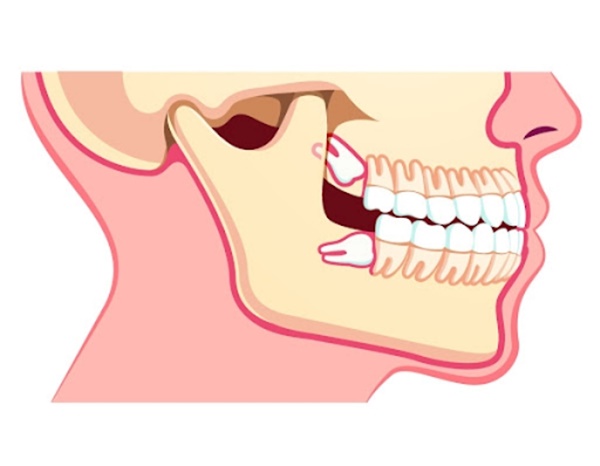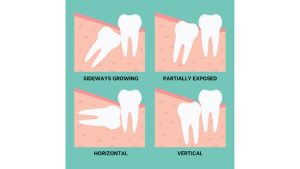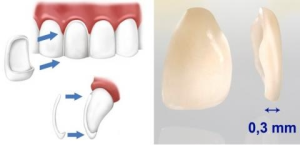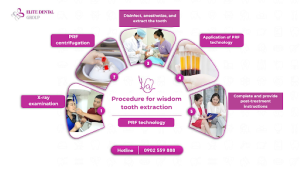Table of content
- 1. Signs of horizontally or crookedly growing wisdom teeth
- 2. Symptoms of horizontally growing wisdom teeth
- 3. What conditions can crookedly growing wisdom teeth cause?
- 4. Should horizontally growing wisdom teeth be extracted?
- 5. Is it dangerous to extract horizontally growing wisdom teeth?
- 6. Where to have horizontally growing wisdom teeth extracted?
- 7. What should be paid attention to after extracting horizontally growing wisdom teeth?
When wisdom teeth grow horizontally or crooked, it becomes a source of distress for many, causing uncomfortable pain and inconvenience in daily activities. In such cases, it’s often necessary to have the crooked wisdom teeth extracted to avoid potential complications that could endanger oral health.
1. Signs of horizontally or crookedly growing wisdom teeth
Wisdom teeth, also known as the eighth teeth, are the last teeth to emerge during adulthood, typically between the ages of 18 to 27, or later in some individual cases. Because they are the final teeth to appear, there is often limited space for them to erupt properly along the dental arch, resulting in conditions such as misalignment, horizontal growth, or impaction.
Accordingly, horizontally positioned eighth teeth often exhibit certain identifiable characteristics:
- They form an angle of 45-90 degrees compared to the seventh tooth, thus impacting directly against the seventh tooth.
- They typically grow impacted beneath the jawbone.

2. Symptoms of horizontally growing wisdom teeth
The appearance of horizontally growing wisdom teeth is often accompanied by common symptoms such as:
2.1. Aching pain
When wisdom teeth erupt along the dental arch, individuals may experience noticeable aching pain in the affected area. This discomfort can extend to the gums surrounding the adjacent tooth, causing swelling and soreness.
2.2. Gum swelling
Initial signs of most types of wisdom tooth eruption include redness and swollen gums. Particularly in cases of horizontally growing wisdom teeth in the lower jaw, individuals may easily observe swollen and reddened gums when examining in the mirror.
Explore more: Does gum surgery cause pain? Essential information about gum contouring
2.3. Bad breath
Horizontal growth of wisdom teeth can trap food particles, leading to bad breath. Additionally, food debris accumulated in this area creates favorable conditions for bacterial growth, potentially causing tooth decay.
Read more: Do dental crowns cause bad breath? Understanding the causes and solutions
2.4. Stiff jaw
Alongside gum swelling, the process of wisdom tooth eruption can impact the nerves, resulting in a stiff jaw. Some individuals may find it difficult to open their mouth wide and experience significant obstacles in daily eating activities.
2.5. Fever
Similar to the symptoms of normally erupting wisdom teeth, horizontally growing wisdom teeth can induce fever and fatigue. This condition primarily occurs due to inflammation in the surrounding gum tissue, triggering the body’s immune response and resulting in fever.
3. What conditions can crookedly growing wisdom teeth cause?
Horizontally growing wisdom teeth can lead to the following complications:
3.1. Misalignment of the dental arch
When wisdom teeth grow horizontally, crowding and exerting pressure on adjacent teeth can cause them to gradually shift, leading to misalignment of the bite. An improper bite can affect chewing ability and cause severe temporomandibular joint pain, making patients extremely uncomfortable.
3.2. Tooth decay and spreading to neighboring teeth
Due to being trapped in a constrained angle or partially erupted position, cleaning becomes challenging. Over time, wisdom teeth may develop cavities, and if left untreated, tooth decay can spread to adjacent teeth.

3.3. Dental cyst
When horizontal growth of wisdom teeth will directly impact on the seventh teeth, and can also potentially form dental cysts. Over time, these cysts can exert negative pressure on the nerves surrounding the tooth, leading to jaw bone inflammation. In severe cases, surgical intervention may be necessary to remove the inflamed bone tissue, which can have lasting effects on chewing function and communication abilities.
3.4. Difficulty in eating, affecting health
Because horizontally growing wisdom teeth are harder to clean than usual, they are more prone to decay and causing discomfort. Additionally, when wisdom teeth grow horizontally and impinge upon the seventh tooth or even the cheek, it can lead to pain.
If wisdom teeth grow partially submerged, they can cause swollen and inflamed gums, leading to discomfort and infection. Individuals may find it challenging to open their mouths wide or eat normally, resulting in fatigue and decreased overall health.
4. Should horizontally growing wisdom teeth be extracted?
In cases of horizontally growing wisdom teeth, extraction is typically necessary to avoid potential complications. However, individuals can rest assured as wisdom teeth do not play a significant role in the dental arch, so their removal does not affect chewing or overall health
5. Is it dangerous to extract horizontally growing wisdom teeth?
Extracting horizontally growing wisdom teeth is a challenging dental procedure. Because the teeth are trapped at an angle, the dentist may face difficulties during the extraction process. Additionally, the teeth may have complex positions, so inexperienced dentists may inadvertently cause trauma, leading to post-treatment swelling, prolonged bleeding, infection, nerve damage, and other complications for patients.
Many people worry about whether double wisdom tooth extraction is dangerous. In reality, wisdom tooth extraction is safe and poses no health risks if performed correctly by skilled dentists with the support of modern equipment. Conversely, if these criteria are not met, wisdom tooth extraction can be quite dangerous and…
6. Where to have horizontally growing wisdom teeth extracted?
That’s why Elite Dental has its own specialized department in oral surgery, with a team of experienced dentists who have undergone in-depth training in oral surgery and have worked for many years at the Dental and Maxillofacial Hospital, University of Medicine and Pharmacy Ho Chi Minh City.

In addition, Elite Dental also invests in modern equipment to provide a smoother experience for wisdom teeth extraction, such as:
- X-ray imaging machines to accurately assess the condition of horizontally growing or misaligned wisdom teeth, enabling meticulous planning for less traumatic extraction.
- PRP (Platelet-Rich Plasma) technology to reduce swelling and pain, and expedite the healing process after tooth extraction.
- Piezotome machines utilize ultrasonic waves to minimize trauma and swelling during and after extraction. You can learn more about it here.
The journey of saying goodbye to misaligned wisdom teeth at Elite Dental is documented through authentic customer testimonials, providing genuine experiences.
Another case entrusted Elite Dental to extract all four wisdom teeth at once. The extraction process took less than an hour and was performed by an experienced dentist who gently removed each tooth, minimizing trauma and greatly reducing swelling and pain. After the extraction, this brave individual happily shared, “There was no pain or fatigue at all.”

If you or your loved ones are experiencing issues with wisdom teeth, don’t hesitate to schedule an appointment with Elite Dental for examination, consultation, and treatment as soon as possible!
7. What should be paid attention to after extracting horizontally growing wisdom teeth?
After the process of extracting horizontally or misaligned wisdom teeth, it’s essential to note the following:
- Oral care: Maintain regular oral hygiene by brushing your teeth at least twice a day with a soft toothbrush to prevent bacterial growth and infection. Use mouthwash and dental floss to clean between teeth. Avoid using sharp objects or toothpicks to remove food debris.
- Dietary regimen: During the initial days of swelling and pain, consume soft, liquid foods such as porridge or soup. Additionally, avoid consuming hot foods as they may stimulate bleeding.
- Pain management: How long does wisdom tooth pain last after extraction? Typically, pain subsides within a week. Take prescribed pain medication and apply cold compresses to alleviate pain. Furthermore, refrain from smoking, drinking alcohol, using straws, or engaging in strenuous activities as they may adversely affect the healing process.
In case of unusual symptoms such as persistent pain, swelling, continuous bleeding, or fever after wisdom tooth extraction, promptly consult a dentist for examination and appropriate treatment.
In general, when signs of horizontally or misaligned wisdom teeth are detected, it’s important to visit a reputable dental clinic. Here, you will undergo an examination by a dentist to assess the condition of your wisdom teeth, thereby determining suitable treatment methods and preventing potential complications.
Related post: > What is the typical cost of wisdom tooth extraction? Update 2024 > Is wisdom tooth extraction painful? Methods for pain-free extraction > 9 Things about Wisdom Tooth Extraction that aren’t widely known







